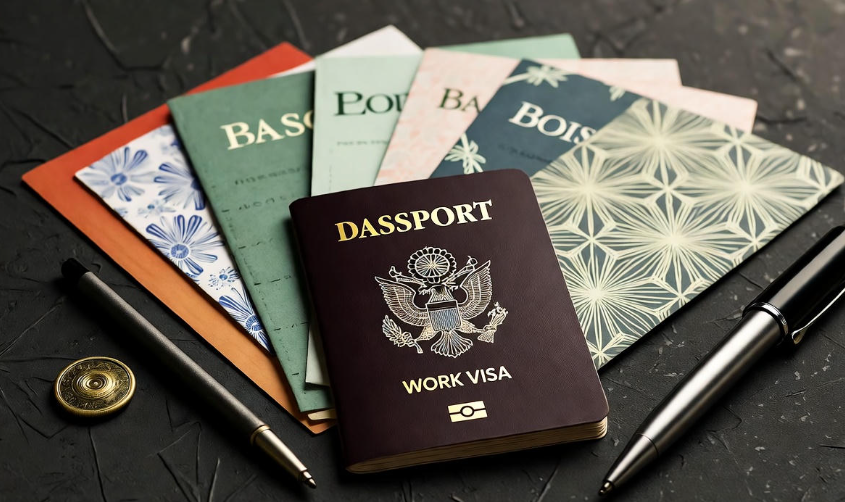Applying for a work visa can be one of the most exciting yet nerve-wracking steps in your career journey abroad . You’ve got your dream job lined up, the company is ready to welcome you, and now comes the paperwork part — yes, the all-important documents.
If you’ve ever wondered, “What papers do I actually need for a work visa?” — you’re not alone. Many applicants get stuck or delayed simply because they didn’t have the correct or complete documents. In this detailed guide, let’s go step-by-step through all the documents you’ll need, what each one means, and a few helpful tips to make your visa approval smoother.
Let’s dive right in
Passport (The Most Important Document)
This one might sound obvious, but it’s worth mentioning first — your passport is your key to the world. A valid passport is the foundation of your work visa application.
Most countries require your passport to be valid for at least 6 months beyond your intended stay. So, for example, if your work visa will last one year, your passport should have at least 18 months of validity remaining.
Also, make sure your passport has:
-
At least two blank visa pages (for visa stamps and entry seals)
-
No serious damage (like torn pages or water marks)
-
An updated biometric photo page
If your passport is close to expiring, renew it before applying — it’ll save you a lot of headaches later.
Work Visa Application Form
Next up is the actual visa application form, which is usually available online on the immigration or embassy website of the country you’re applying to.
You must fill it out carefully and honestly. Even a small mistake — like spelling your name differently from your passport — can lead to delays or rejection.
Some countries allow online submission, while others may ask you to print and submit it in person. Always double-check the instructions.
A little tip : print an extra copy of your completed form and keep it in your personal file.
Job Offer Letter or Employment Contract
This is the document that proves why you’re applying for a work visa in the first place.
A job offer letter (or employment contract) should clearly mention:
-
The name and address of your employer
-
Your position title and job duties
-
Salary or compensation details
-
Duration of employment
-
The company’s registration details
Make sure it’s signed and dated by both you and your employer. Some embassies even ask for the company’s business license copy to verify the employer’s legitimacy.
If your employer is sponsoring your visa, the sponsorship letter might also be required (we’ll discuss this later).
Passport-Sized Photographs
Yes, those small photos matter a lot!
Each country has its own specific size and background color requirements for visa photos. For example:
-
USA and Canada: 2×2 inch white background
-
UK: 35mm x 45mm light grey or cream background
-
EU countries: 35mm x 45mm white background
Here’s a quick table for better clarity:
| Country | Photo Size | Background Color | Expression |
|---|---|---|---|
| USA | 2×2 inch | White | Neutral |
| UK | 35×45 mm | Light grey/cream | Neutral |
| Australia | 35×45 mm | White | Natural smile allowed |
| Canada | 50×70 mm | White | Neutral |
Always carry 2-4 extra copies — sometimes the visa office or biometrics center may ask for them.
Educational Certificates and Professional Qualifications
Your qualifications speak for your eligibility. Most work visas require proof that you’re skilled or educated enough for the job.
You should include:
-
Degree or diploma certificates
-
Transcripts (optional but helpful)
-
Professional training certificates
-
Skill assessment results (for countries like Australia or New Zealand)
Make sure these documents are attested and translated (if not in English or the country’s official language).
For example, if you’re applying for a German work visa and your degree is from Pakistan, you might need to get your credentials evaluated by Anabin (Germany’s foreign education recognition system).
Proof of Work Experience
If your job offer is based on experience rather than formal education, you’ll need to show your previous employment history.
These may include:
-
Experience letters from previous employers
-
Reference letters from supervisors
-
Pay slips or tax documents as proof of employment
Remember, this helps prove you’re not just qualified on paper, but you also have real-world experience to do the job confidently.
Medical Examination Report
Some countries require you to undergo a medical check-up to confirm that you’re healthy and free from infectious diseases.
For example:
-
The UAE and Qatar require medical fitness reports.
-
Australia, New Zealand, and Canada may ask for a medical exam from approved panel doctors.
A standard medical report usually includes:
-
Chest X-ray
-
Blood tests
-
General health check (eyes, heart, lungs, etc.)
Keep a copy of your report for your personal records too.
Ready to work abroad? Explore Top Work Visa Programs for Skilled Professionals.
Police Clearance Certificate (PCC)
This is another critical document that often surprises applicants.
A Police Clearance Certificate (or Good Conduct Certificate) proves that you have no criminal background. It’s issued by your local police department or passport office.
In most cases, the certificate must be less than six months old at the time of submission.
If you’ve lived in more than one country during the past few years, you might need to provide police certificates from each of them.
Proof of Financial Stability
Even though you have a job offer, many countries still want to see that you have enough funds to support yourself until your first paycheck arrives .
Acceptable proofs include:
-
Recent bank statements (3–6 months)
-
Sponsorship letters from your employer (if they’ll cover your expenses)
-
Proof of accommodation or prepaid housing contracts
Here’s a quick example table:
| Document Type | Purpose | Validity |
|---|---|---|
| Bank Statement | To show financial health | Last 3–6 months |
| Sponsorship Letter | Proof employer will cover expenses | Official company letterhead |
| Accommodation Proof | Shows where you’ll stay | Should match your application form |
Visa Fee Payment Receipt
A small but important one — always attach your visa fee payment receipt. Without proof of payment, your application might not even be processed.
You can usually pay:
-
Online (credit/debit card)
-
Bank transfer
-
Cash at embassy or visa center
Print and keep a copy of the confirmation email or payment slip.
Cover Letter or Statement of Purpose
A cover letter adds a personal touch to your application. It tells the visa officer why you’re applying and how you meet the eligibility requirements.
It doesn’t need to be long, just clear and polite. Example structure:
-
Introduction (who you are)
-
Job details and employer info
-
Your qualifications and experience
-
Assurance of following the country’s laws
-
Thank you note
A well-written letter can make your file stand out! ✨
Curriculum Vitae (CV) or Resume
A professional CV helps visa officers quickly understand your background. Make sure it’s updated and matches the information in your other documents.
Include:
-
Contact info
-
Education
-
Work history
-
Skills and certifications
-
References (if applicable)
Keep it concise — one or two pages are enough.
Sponsorship Letter (if applicable)
If your employer is sponsoring your visa, they’ll need to issue a sponsorship or invitation letter.
This document confirms that:
-
They are officially offering you employment
-
They’ll be responsible for your stay or financial matters during employment
It must be on official company letterhead, signed, and dated.
Proof of Accommodation
Where will you stay when you arrive? Immigration officers often ask for this to make sure you’re not arriving without a plan.
You can submit:
-
Hotel booking confirmation
-
Rent agreement or housing contract
-
A letter from your employer stating accommodation is arranged
This is especially important for the first-time workers abroad.
Travel Insurance
Not every country requires it, but having travel or health insurance during your stay is always a smart move .
Insurance should cover:
-
Medical emergencies
-
Repatriation
-
Hospitalization
Some visas (like Schengen work visas) make it mandatory to have coverage of at least €30,000.
Additional Country-Specific Documents
Each country has its own extra requirements. Here are a few examples:
| Country | Additional Required Documents |
|---|---|
| Canada | LMIA approval or employer compliance number |
| Australia | Skills assessment certificate |
| UK | Certificate of Sponsorship (CoS) |
| Germany | Anabin degree recognition proof |
| Japan | Certificate of Eligibility (COE) |
Always visit the official immigration website of the country you’re applying to for the most accurate, up-to-date list.
Final Checklist Before Submission
Before you submit your application, double-check everything:
✅ Valid passport (with enough blank pages)
✅ Signed application form
✅ Job offer or contract
✅ Education & experience certificates
✅ Medical and police certificates
✅ Financial proof
✅ Visa fee receipt
✅ Photos in correct format
✅ Cover letter & CV
✅ Additional documents (if needed)
You can even create a small folder or use paper clips to keep each document set neatly separated — visa officers love organized files!

Tips to Avoid Common Mistakes
Here are a few quick reminders many applicants forget:
⭐ Always use official English translations for documents not in English.
⭐ Make photocopies of everything you submit — keep one copy with you.
⭐ Don’t staple documents; use clips or folders.
⭐ Follow the photo guidelines strictly.
⭐ Submit originals and copies as required (check embassy website).
A little extra care here can save weeks of waiting or rejection.
FAQs (Frequently Asked Questions)
Q1: Do I need to submit original documents or photocopies?
Most embassies ask for originals with photocopies. The originals are usually returned after verification. Always check the specific country’s checklist.
Q2: Can I apply without a job offer?
For a work visa, usually no — you need a valid job offer or employment contract. However, some countries offer job seeker visas that let you search for work after arrival.
Q3: How long does the work visa process take?
Processing time varies from 2 weeks to 3 months, depending on the country and your application type.
Q4: What happens if I submit incomplete documents?
Your application might be rejected or put on hold. Always ensure your file is complete before submission.
Q5: Is medical insurance really necessary?
Yes, especially for long-term work visas. It’s both a safety and legal requirement in many countries.
Q6: Can I reapply if my visa is rejected?
Yes, but first find out the reason for rejection, fix it (e.g., missing documents or unclear proof), and then reapply with a stronger file.
Final Thoughts
Getting a work visa is not as hard as it seems — it just takes preparation and accuracy. Having all the required documents in order makes the process smoother and increases your chances of approval.
Think of it like this: your documents tell your story — who you are, what you’ve achieved, and why you’re ready to work abroad. So make sure that story is well-organized and clear.
If you follow this checklist carefully, you’ll not only save time but also impress the visa officer with your professionalism and attention to detail.
Good luck with your work visa journey — your next big career adventure awaits! ✈️




